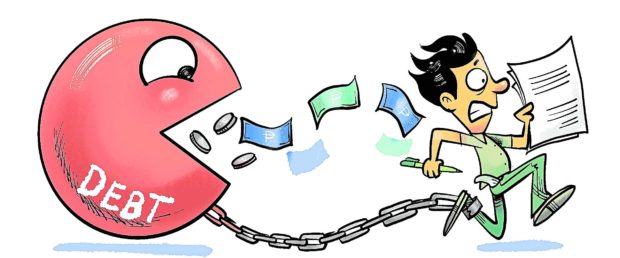Filipinos have gone deeper in debt in 2021.
What’s worse is that in true Philippine style, these kinds of debts carry with them massive, hidden, compounded interest of 3 percent per day. Some online lenders are harassing those who are not able to pay; they sell borrowers’ information, and their physical addresses in their websites are bogus. Those who wish to restructure their loans have no way to officially communicate with these companies.
The screenshots of mobile phone messages from debt collectors are unbelievably crass. “(Expletive) ninyong dalawa, mga magnanakaw. Bayaran ninyo ang pinagsabwatan ninyong pera kung ayaw ninyo may bumulagta na lang sa mga pamilya at mga kaibigan ninyo. Nakatimbre na kayo. Nandito ang mga litrato at mga information ninyong mga (expletive) kayo. Buhay ang kabayaran sa perang ninakaw ninyo. Tatrabahuhin ko kayo; hindi ko kayo titigilan tandaan niyo yan,” one reads. The rough translation is something that you’ll expect to hear from gangsters, not from financial institutions: “You two are @#$%# thieves. Pay your debt if you don’t want any of your family or friends to fall. You’re in the hit list. We have your pictures and personal information, you @#$@%%. You will pay with your lives, I will make sure of that. I won’t let this go, remember that.”
Fintech, which is touted as the savior that will democratize finance, has a very dark side.
Some borrowers may have misused their money, causing them to go into debt. Others have been battling health-related financial issues in the past two years. No matter the cause of indebtedness, however, all borrowers have rights. Their information must be protected and they should not have to face these kinds of harassment.
In fact, the Securities and Exchange Commission (SEC) recently issued a prohibition on the registration of new online lending platforms due to the wave of complaints it has received from borrowers. Memorandum Circular No. 18, Series of 2019 states that unfair debt collection practices like threats, obscenities, disclosure of private information and even making contact at unreasonable hours will be penalized. The penalty of P100,000 maximum could be increased to make it a stronger deterrent, but it is already a good start. Memorandum Circular No. 19 now requires registration of all online lending agencies and platforms with the SEC.
Crackdown against usury
An interest rate cap is also now in the works. Kelvin Lee, commissioner of the SEC, told me in a text message that the SEC and the Bangko Sentral ng Pilipinas (BSP) are in the process of finalizing the board circular. This should be out this mid-January.
To date, the BSP already prescribes a maximum of 2 percent monthly interest rate on credit card lending or 24 percent a year.
“The primary focus of the SEC is consumer protection, thus the strict regulations for online lending. If they are found to be in violation, we will have them removed by Google or Apple (app stores) and shut down these companies. But we notice that some of these entities are unregistered entirely,” Lee said.
This means borrowers themselves must shake off the utang (debt) culture in 2022. No single personal finance advice bears more weight than being wise in choosing your lender, learning how to compare and compute effective interest rates, and embracing financial literacy.
For example, someone who borrows P3,000 may get a net loan amount of P2,800. He or she then pays P3,500 in four days. This translates to 2,281.25 percent interest per year. No amount of investing can help you gain that much. And because the interest rate is so high, you end up borrowing again to refinance that loan. After all, you can get the money straight to your GCash in five minutes.
That’s how financial rabbit holes are created. Not even the common 5-6 lenders were as convenient and as deadly.
Free yourself
For those who are already caught in the clutches of these scammy online lending apps, here are some tips:
1) Negotiate with your borrower in writing. Send your letter to the online lending platform via courier, and get these documents received with a date and a signature. Do it as soon as you realize that you cannot meet your due dates. Do not use mobile phones, calls or emails. You need to have documentation. Some of those who successfully negotiated brought their total payments down by 80 percent.
2) Alert your contacts in your phone that someone might be sending them these kinds of messages. It’s better that they hear your predicament from you.
3) If your emotional and mental state is already in jeopardy, change your number and deactivate your social media accounts.
4) Inventory all your debts. Put them in a spreadsheet with the highest interest rates listed first. Plot out a debt payment push plan where you are able to pay off each of your lenders every period. Every time a lender is paid off in full, add the amount you pay to it to the second loan amount. This greatly accelerates your payment process.
5) Look for registered and legitimate loan consolidators. Try government lenders like the Social Security System or Government Service Insurance System, cooperatives, or family and friends. Sell as many of your personal belongings as you can. If you are borrowing from family and friends, write up a contract and terms for your borrowing. And make sure you pay them on time.
My company, Empower and Transform, is helping those who are buried in debt due to unavoidable circumstances like hospitalization and debt by teaching them these strategies. —CONTRIBUTED INQ


